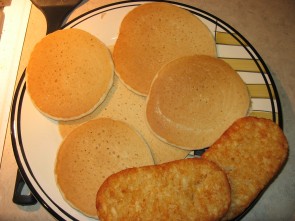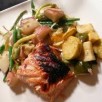To continue the tips mentioned in an earlier article, the CRCA Coaching program is featuring this web post of a Nancy Clark, MS, RD, CSSD (Certified Specialist in Sports Dietetics) handout. Nancy Clark is not the only expert. There are multiple expert sources of nutrition and cycling. Others include:
• Monique Ryan, MS, RD, LDN • USAC's Laura Anderson, MS, RD, CSSD • And ex-CRCA member, Julie Upton, MS, RD, CSSD.
Take advantage of their expertise.
THE PRE-COMPETITION MEAL (www.nancyclarkrd.com)
When it comes to pre-competition eating, you have to learn through trial and error during training what foods and fluids work best for your body. No single food or meal is perfect for everyone. Some athletes (such as those in running and jumping sports) may prefer to eat nothing for four hours pre-event. But most athletes perform better after having eaten a small (100 to 300 calorie) snack within an hour, or a moderate (300 to 600 calorie) meal within three hours of the event. The goal of this pre-event meal is to enhance stamina and endurance without causing stomach discomfort or intestinal distress. The meal or snack helps:
• maintain a normal blood sugar and prevent performance problems associated with hypoglycemia, such as light-headedness, blurred vision, needless fatigue, inability to concentrate, and indecisiveness.
• prevent hunger, settle the stomach, and absorb some of the gastric juices.
• provide energy to fuel the muscles. Despite popular belief, your body can digest the food you eat before you exercise and put it to good use!
Just as eating too much pre-exercise food can have adverse effects (nausea, stomach cramps), so can eating too little (low energy). The following guidelines offer points to consider regarding your own personal pre-event food choices. Experiment during training to learn which foods–and how much–work best for you.
1. Choose primarily carbohydrates before an event because they digest quickly and are readily available for fuel. Some popular choices include bananas, cereal, bread, bagel, crackers, and pasta. A little protein and fat are OK to eat for sustained energy, but large portions of fried and fatty meals will linger in the stomach and may feel heavy, uncomfortable, and talk back.
2. Pay attention to meal timing. In general, you should allow 3 to 5 hours for a large meal to digest; 2 to 3 hours for a smaller meal, 1 to 2 hours for a liquid meal (such as Boost, Carnation Instant Breakfast), 0 to 1 hour for a small snack (such as a banana). As well, eat extra carbs the day before the event and do minimal exercise so your muscles have time to optimally refuel.
Before morning events: Eat a hearty, high carb dinner and bedtime snack the night before the event. That morning, eat a light meal as tolerated. See food suggestions below.
Before afternoon events: Eat a hearty breakfast and a lighter carbohydrate-based lunch.
Before evening events: Eat a hearty breakfast and lunch, then a light meal as tolerated 1 to 2 hours prior.
Some athletes break all the rules and enjoy a big meal within an hour of the event and suffer no digestive problems. Others prefer to eat nothing for four hours prior. You simply have to experiment during training to determine what foods (if any) settle comfortably, when you should eat them (one, two, or three hours prior?), and how much you can eat.
hour of the event and suffer no digestive problems. Others prefer to eat nothing for four hours prior. You simply have to experiment during training to determine what foods (if any) settle comfortably, when you should eat them (one, two, or three hours prior?), and how much you can eat.
3. If you are too nervous to eat anything before the event, make a special effort to consume extra food and fluids the day before to help compensate for lack of event-day fuel. On event day, try sipping liquids or eating a few crackers; any fuel is better than no fuel.
4. Always eat familiar foods prior to competition. Do not try anything new! Experiment with new foods during training to determine if they settle well or cause gas, heart burn, cramps, or intestinal discomfort.
5. Eat a carbohydrate-based diet every day to prevent chronic glycogen depletion and ensure adequate glyco- gen replacement. One high-carb pre-event meal does not compensate for a week of inadequate fueling.
6. When traveling, plan to bring your favorite sports foods such as a tried-and-true cereal, energy bar, fruit, or sandwich. This way, you can worry less about fuel- ing yourself and be free to focus on performing.
7. Enjoy foods that please the mind as well as the body The pre-event meal may have a greater psychological than physiological value. For example, if you firmly believe that a steak dinner helps you perform well, then eat it even though this meal "breaks the rules" regarding pre-game suggestions. The steak simply fills your stomach but leaves your muscles unfueled. You can, however, accompany the steak with carbohydrate-rich foods that will fuel your muscles—a noodle-type soup, potato, rolls, vegetables, juice, frozen yogurt.
Sample high carbohydrate, low fat pre-competition food suggestions
Breakfasts: oatmeal, cold cereal, banana, toast, juice, muffin, bagel, yogurt, french toast, pancakes.
Lunches: sandwich with hearty bread but little mayo, noodle soup, thick-crust pizza w/ single cheese
Snacks: crackers, cereal, bagel, toast, canned or fresh fruit, yogurt, energy bar, small turkey sandwich.
Dinners: spaghetti with tomato sauce; a small serving lean protein with extra rice, noodles, potato, rolls.
Copyright: Nancy Clark, MS, RD, CSSD Healthworks, Chestnut Hill, MA 02467 • nancyclarkrd.com Reprint permission granted with proper credit.




